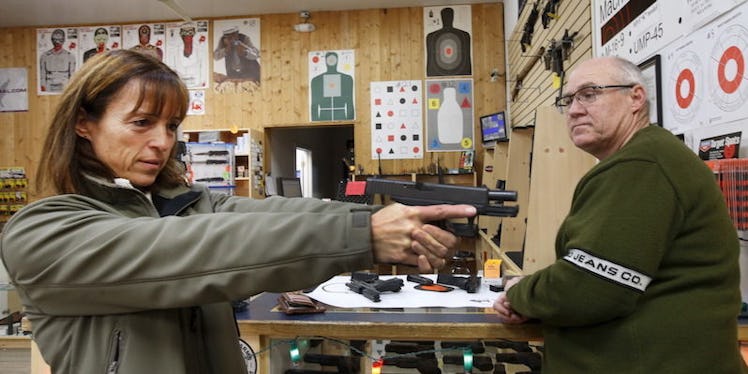
People Keep Having This Irrational Response To Mass Shootings
Mass shootings induce a number of different reactions in people.
After these incidents, we can almost always count on fierce debates over gun control. These conversations are rarely productive, however, due to the emotional nature of this issue.
Understandably, mass shootings make people feel afraid.
Some fear guns so much, they want the country to ban them all together. Others either fear losing their gun rights or being in active shooter situations so much, they feel the need to arm themselves immediately.
Both positions are irrational, in the sense Congress is so heavily influenced by the NRA, you can safely bet it will not pass any new gun laws, even in the wake of highly publicized mass shootings.
This country is very attached to its 2nd Amendment rights, and they aren't going anywhere.
Sadly, even hoping for moderate gun reform is pretty irrational, as this country's endless love affair with firearms deters it from making even the smallest of legislative changes.
It doesn't matter roughly 90 percent of Americans, including many gun owners, support expanding background checks; Congress just won't budge on this issue.
But that doesn't stop people from running straight to the gun store after mass shootings in order to arm themselves to the teeth.
Indeed, gun sales soar after tragedies like the recent shooting in Orlando.
If you look at the number of background check requests, you can get a pretty good measure of firearm sales across the country.
In 2012, FBI data shows the monthly average for background check requests in the state of Connecticut was 18,932. After the 2012 shooting in Newtown, Connecticut at Sandy Hook Elementary School, the number of background check requests rose drastically to 29,246 in December of that year, the same month the shooting occurred.
A similar trend occurred in California the month of the shooting in San Bernardino: Background check requests nearly doubled from the monthly average the month of the shooting.
The NRA argues if more people were armed, we'd all be a lot safer. But when you look at the numbers, it's quite clear guns are very rarely used in self-defense. They are far more likely to be used in a criminal capacity or to inflict self-harm, whether accidental or intentional (approximately two-thirds of all gun deaths per year are suicides).
In other words, running off to arm yourself after a mass shooting might seem like a good idea, but the data shows where there are more guns, there is more death. Guns do not make us safer.
Buying a gun in response to a mass shooting is, arguably, one of the most counterintuitive things you can do.
Correspondingly, if you're worried a mass shooting is going to lead to extremely restrictive gun reform in this country and feel you need to buy a gun before this happens, your fears are decidedly unfounded.
Congress has consistently proved it's completely unwilling to do anything about gun violence, regardless of the frequency of mass shootings and the level of public support for things, like expanded background checks.
If you feel the need to exercise your constitutional right to bear arms, that's your prerogative. But buying a gun in response to a mass shooting is, arguably, one of the most counterintuitive things you can do.
Fear makes us human, and in many cases, deters us from doing something that might bring us harm. But, fear also has the capacity to make us act against our self-interests, as it clouds reason and permits our emotions to take control.
Purchasing a firearm should be a decision made after much forethought, training and education. It should not be an emotive response to a horrific tragedy.
Citations: Daily Mail